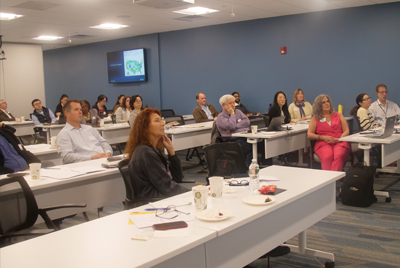Accounting Educators Look to Move the Profession Forward
by Kathleen Hoffelder, NJCPA Senior Content Editor –
April 17, 2025

High school teachers and college professors had a successful NJCPA Accounting Educators’ workshop when they met at Society headquarters in Roseland on April 4 to discuss what’s trending in the accounting profession, hear updates on the use of artificial intelligence (AI), learn the latest anti-fraud tactics and find out how to encourage more students to become CPAs.
Additional Pathway to Licensure
Aiysha (AJ) Johnson, MA, IOM, CEO and executive director of the NJCPA, explained the Society’s involvement in proposing an additional pathway to CPA licensure. The NJCPA has drafted a bill to modify New Jersey’s Accountancy Act to enable CPA candidates to qualify for licensure by earning a bachelor’s degree, completing two years of experience and passing the CPA Exam. Under current law, candidates for a license must earn at least 150 credits (a bachelor’s degree plus 30 extra credits, or a master’s degree), gain one year of work experience in accounting and pass the CPA Exam. This option would remain in place.
According to Johnson, “It’s very important to provide options for those students and professionals seeking to become CPAs. An additional route for licensure will not only open the field up to more individuals, but businesses will benefit from augmenting the pipeline of CPAs.” She noted that the NJCPA and its Board of Trustees understands the necessary role that academia plays in encouraging students to become CPAs and accounting professionals.

AI’s Impact
Practical applications of AI are increasing every day but, according to Dr. Sean Stein Smith, CPA, CFE, CGMA, CMA, DBA, a professor at the City University of New York – Lehman College and a presenter at the event, “it is still in the very early days until being fully implemented in accounting firms.” Moreover, the use of AI, in his words, is what will allow CPAs to be thoroughly considered trusted advisors since it is “opening up a whole other world” and will reduce or eliminate mundane data entry functions.
June M. Toth, CPA, CFF, CITP, CGMA, principal at WilkinGuttenplan, 2024/25 NJCPA president and a panelist at the workshop, agreed that AI should be embraced as a “tool,” noting it is very helpful with data and gap analyses. “Our profession is changing rapidly, and we need to keep up with those changes,” she said. Being on the cutting edge is important to the next generation of CPAs and accounting professionals, she added, but so is the environment we work in. “We need to be more intentional with company cultures.”
Several practical uses of AI in accounting, noted Stein Smith, should include helping to gather data from invoices in accounts receivable, verifying the accounting of the invoices, routing invoices for payment or approval and even helping project cash flow. Automation, he added, also helps with AI to send reminders to clients, allowing staff to spend more time on critical tasks. It also works to reduce non-billable time by automating notifications, approvals and document management. With tax preparation, he explained, it can minimize tax liability and help ensure compliance as well as collect and organize tax information from clients.
Stein Smith noted that accounting students are learning AI from experimentation, but at the college level, schools do not readily accept the use of AI in all assignments. Colleges and universities have several tools available to detect plagiarism in submissions, he said. These products include GPTZero, Originality.AI, Scribbr’s AI Detector, Copyleaks, QuillBot and Grammarly’s AI Detector.
Quoting a recent Gartner report, Stein Smith explained that as AI use expands, there are increasing concerns about governance and safety. More jurisdictions are introducing new regulations that drive and challenge organizations to adopt Responsible AI (RAI) practices.
Warding Off Fraud
Other advice for high school teachers and college professors to pass on to their accounting students include using their own voice and having more communication skills. Megan Sartor, CPA, ABV, CFF, a partner at SAX and a presenter at the event, noted the importance for academia to encourage students to “pick up the phone and have a conversation.” She said students and young professionals today rely too heavily on text messaging and emails instead of discussing an issue over the phone, where many times it could be resolved more quickly.
Though tech savvy, students as well as young professionals also need to be wary of cryptocurrency and digital fraud, according to Megan Kelly, CPA, CFE, CVA, a director at FAZ Forensics. “I’ve been seeing that a ton over the last year,” she explained, whereas with more advanced technology, voice manipulation through AI has affected the elder community more.